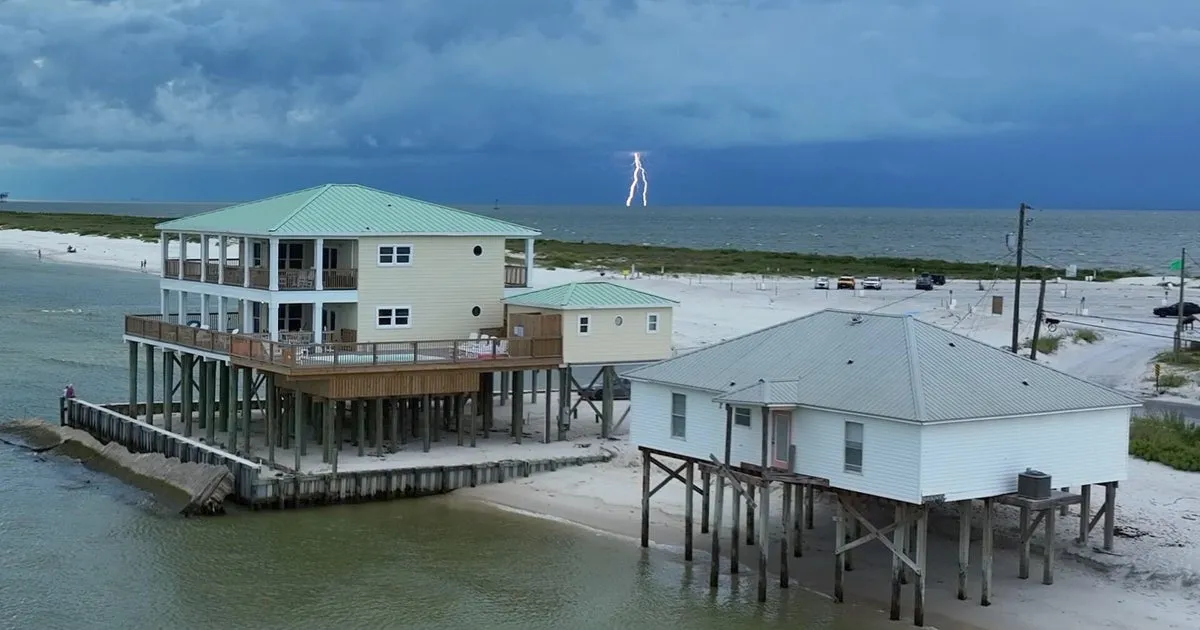
Hurricane Katrina was a catastrophic event that profoundly affected over a million people across the Gulf Coast region. Nearly 1,400 lives were lost, with a significant number of casualties occurring in New Orleans. Now, 20 years later, many communities are still grappling with the aftermath of this disaster. According to the National Hurricane Center, Hurricane Katrina remains the costliest hurricane in U.S. history, with damages exceeding $201 billion when adjusted for the 2024 Consumer Price Index. The storm caused extensive flooding across Louisiana, Mississippi, and Alabama.
On Dauphin Island, Alabama, the impact of Hurricane Katrina was particularly severe. The storm severed the town's west end beach, creating a 1.5-mile-wide gap. Over 300 homes were destroyed, and for many properties, the land they once occupied has been permanently washed away. Since Katrina made landfall on August 29, 2005, Dauphin Island has continued to shrink due to the effects of subsequent storms and rising sea levels. This situation has left the island facing an existential crisis.
Mayor Jeff Collier never anticipated the extent to which storms would impact the island. Some residents are still paying property taxes on land that is now submerged in the Gulf, with vacationers often swimming above these underwater lots. During a tour with a CBS News crew, Collier pointed out areas where these lots are located, estimating that there are approximately 50 submerged lots in that stretch of the island. Many homes remain standing but are precariously positioned, with their foundations now extending into the Gulf. While some of these homes are still being rented out, Collier warns that it is only a matter of time before another storm exacerbates the destruction.
Over the past two decades, the town has made efforts to rebuild its famous white sand beaches. Last year, using funds from the Deepwater Horizon Oil Spill settlement, the town initiated a beach erosion project on the east end, successfully pushing back Gulf waters by about 350 to 400 feet. However, on a barrier island like Dauphin Island, ongoing maintenance is essential to ensure the safety and viability of the area.
Local resident Jillian Fairbanks has witnessed the erosion first-hand and expressed concern over the rapid loss of sand. "Just about a year later, I can already tell that the sand has eroded, I'd say 30 meters or so at least," she stated. Fairbanks and her family have advocated for beach restoration projects for years, emphasizing the peaceful and calm atmosphere of the island. "I'll come here as long as it's here," she said.
To preserve what remains of Dauphin Island, millions of dollars in grants are necessary. The town is planning to use more oil spill settlement funds for a $60 million beach restoration project on the island's west end. Mayor Collier is actively seeking additional funding sources to make this project a reality. He is also working with an Environmental Protection Agency grant to upgrade the town's stormwater runoff systems, which will help mitigate street flooding during storms, even during less severe weather events. As of April, the town had already spent more than $420,000 on a $1.2 million project.
Due to the ongoing need for maintenance and oversight, Collier sought assistance from a specialized program by FEMA. A grant for a $250,000 project would enable the town to hire an engineering and design firm to develop a comprehensive disaster mitigation plan. The Building Resilient Infrastructure and Communities (BRIC) program aims to invest in state planning and capacity building, including $2 million for Alabama to support statewide building code implementation costs.
According to Derrick Hiebert, who oversaw the BRIC program, FEMA has selected over 1,900 projects valued at nearly $5 billion, including significant funding for flooding mitigation projects across the country. However, the Trump administration recently canceled the program, citing it as wasteful and ineffective, a decision that has stirred controversy among local governments relying on these funds.
A group of 20 states has sued the Trump administration, arguing that the termination of the BRIC program was illegal. In response, a FEMA spokesperson stated that resiliency remains a priority for the Department of Homeland Security. However, they also criticized the Biden administration for allegedly using BRIC funds to support its green agenda, which has resulted in funding cuts affecting nearly 700 projects at an estimated cost of $3.6 billion.
Earlier this month, a federal judge temporarily blocked the reallocation of BRIC funding, arguing that it could cause irreparable harm to flood-prone areas. Meanwhile, Mayor Collier remains in a state of uncertainty regarding federal support. "We're kind of in a limbo situation right now, waiting to see what comes out of that," he remarked. If necessary, Collier is prepared to finance the hazard mitigation plan out of pocket, stating that it is a critical need for the community.
The situation on Dauphin Island is urgent, as the beach continues to erode even without major hurricanes. Collier expressed his concerns about the future, stating, "What keeps me up at night is knowing that additional hurricanes will eventually hit this area... There's a clock ticking, and we have a limited time to implement changes before the next storm arrives." The resilience of Dauphin Island and its community hangs in the balance as they strive to navigate the challenges posed by climate change and funding uncertainties.